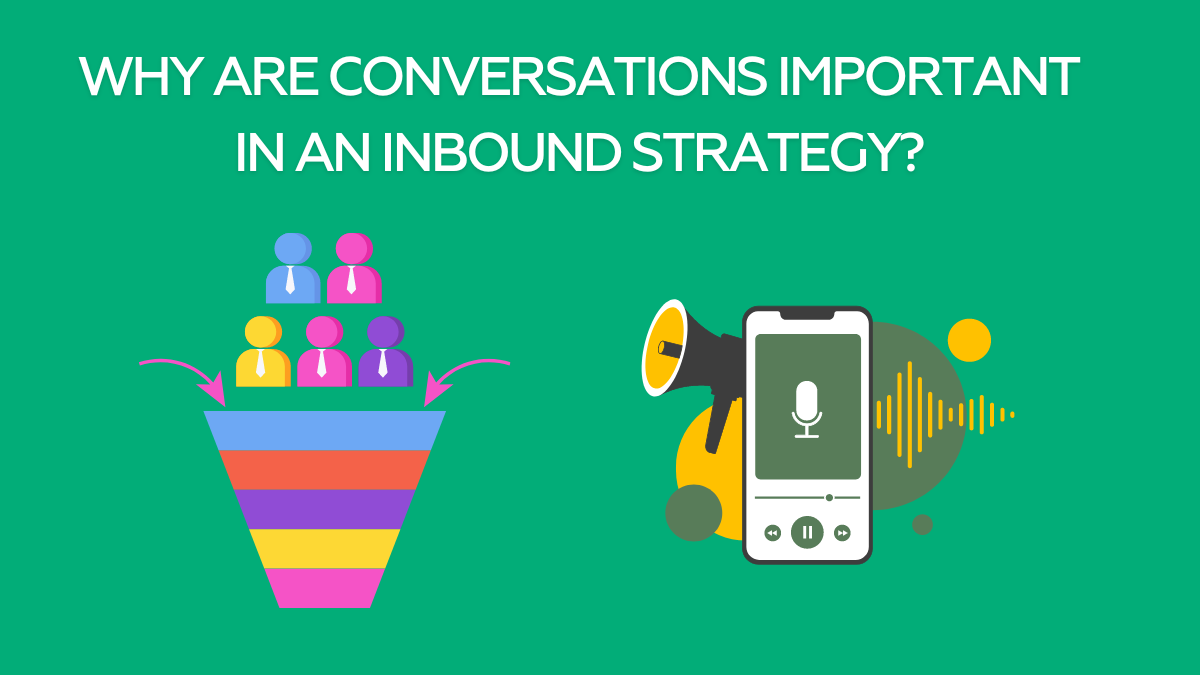If you want your businesses to thrive and make a lasting impact on your target end consumer, it’s time you start talking to them. It would be best to make effective and meaningful conversations via your inbound marketing strategies to achieve your goals. The approach will enable companies to understand what their target end-user thinks, want, and feel.
However, we must answer the question, "Why are conversations important in an inbound strategy?" So, let’s explore how conversations help build relationships with consumers and your organization’s inbound marketing strategy.
What is Inbound Marketing?
According to research, 41% of marketers claim inbound marketing provides increased ROI. Also, 79% of companies state blog reporting drives positive ROI for inbound marketing. Therefore, a properly executed strategy is 10x more effective for lead conversions than outbound strategies.
Traditional/outbound marketing uses a seller-centric approach, focusing on the organization's work and the services it offers to potential end-users. Outbound marketing interacts with its audience through blogs and content creation on social media platforms or the company's product website.
Inbound marketing, in contrast, helps drive the focus away from what the company is selling toward ‘who’ the company is and ‘what’ it has to offer. This type of marketing revolves around addressing customer pain points and driving solutions for building relationships.
Why are conversations meaningful in an inbound strategy?
Another name for a company focused on inbound marketing is relation-focused. They aim to draw the target audience toward their product or service and website. A conversation is an interaction or dialogue between two people and still plays a significant role in today’s age of digital automation. These meaningful exchanges of sentences allow you to understand your consumers better and filter out the expectations of your potential customers.
Numerous ways can help achieve this, but the most effective is via conversations. These are mutually beneficial since they build relationships with current and future potential users. Below are some significant reasons for these conversations: Conversations help customers make timely and effective purchase decisions.
Practical discussions help seal deals and encourage trust and loyalty between suppliers and consumers.
The tools allow you to upsell specific products once you grasp the needs of your end customers.
What are the points where conversations fit into your inbound marketing strategy?
Whether it’s direct contact or over social media sites, every conversation is critical since it pushes the consumer one step closer to making a purchase. Hence, companies should focus on building lasting relationships to increase their outreach and chances of interactions.
Now that you understand the importance of conversations, let’s focus on how you should implement them to enhance sales and marketing CRM:
Understand the consumer journey
The first and foremost task is understanding the touchpoints in your sales funnel that could initiate a conversation. These points will vary depending on whether your consumer is new or keeps buying from you now and then.
Share relevant content
By creating beautifully written content, you can encourage meaningful conversations on your social media platforms. This content should engage your target audience and the channels they use. Consumers are more likely to respond well to relationship-building conversations than sales-based conversations.
Create engaging blogs
Well-researched blogs based on a solid marketing strategy help build strong consumer relationships. They should consist of static landing pages and a Call to Action (CTA), directing consumers toward your services after reading your content. SEO-optimized posts and robust digital marketing software can help boost conversations.
Utilize data-capturing tools
If you achieve the milestone of delivering more traffic to your site, the next phase is recording customers’ data like name, location, and contact details. You must ensure that consumers clicking on your social media post can leave their details so they can stay in touch with you. Also, research says that 17% of marketers use service landing pages to enhance conversion rates.
Inbound Marketing Technologies and Tools
In addition to static inbound tools like blogs, emails, and social media posts, interactive tools like chatbots and feedback loops are also essential for an effective inbound strategy. Having individual landing pages for every product or service will produce different buyer personas and help filter out parts of your target market.
These practices make it easier to create a landing page designed specifically to persuade consumers to take the next step in their purchasing journey. Also, updating posts, podcasts, and content relieves you from the hassle of generating it from scratch. These approaches all help increase your overall website views.
AI-powered chatbots and virtual assistants also help drive direct conversations with consumers. Automation also decreases the overall staff burden. The available data can be easily analyzed using tools like ML to make predictions and well-informed decisions.
Conclusion
Irrespective of your business's domain, conversations still play an essential role in most sales transactions. In the digital content marketing era, you need to stay at the top of your game to compete with other businesses in your area and worldwide. So, it’s crucial that your company builds effective inbound marketing strategies and improves both the success of your content marketing and your conversations.
Read more about Inbound Marketing Automation Services and how you can benefit from them.

